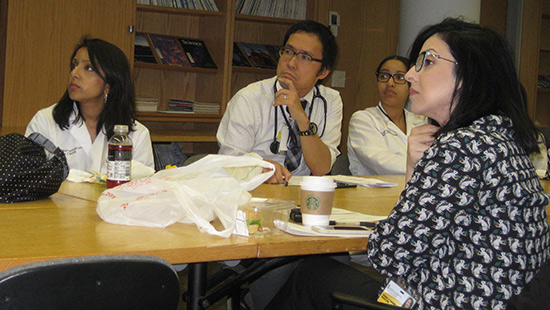Curriculum - Infectious Diseases Fellowship

To set up a visiting rotation with the UMMC Infectious Diseases Program, email David Riedel at driedel@ihv.umaryland.edu.
Year One - Infectious Diseases Fellowship
The first year is clinically oriented and is spent consulting on patients spanning the entire spectrum of infectious diseases. The diversity of clinical experience obtained through the various rotations is exceptional and one of the program’s true strengths. Fellows rotate at the University Hospital [General; Surgical; Transplant (kidney, pancreas, liver, heart, lung); Critical Care; and Cancer (includes BMT)]; HIV/ID inpatient ward; as well as the Veterans Affairs Medical Center, UMMC - Midtown Campus, and in the Clinical Microbiology Laboratory.
Additional time for all fellows is spent among Infection Control and Hospital Epidemiology, Antibiotic Stewardship, and Ambulatory (includes OPAT – outpatient antibiotic therapy).
Fellows see consults and supervise residents and medical students, and spend much of their time teaching and providing patient care. Daily work is performed under the guidance of faculty with expertise in the various subspecialties within infectious diseases.
First Year Schedule
- 9-10 months of the year are spent on the inpatient clinical rotations
- 2-3 months are spent in elective rotations
- A half-day longitudinal/continuity clinic each week at one of our main clinic sites.
- Baltimore VA Infectious Disease Clinic
- THRIVE Clinic at UMMC - Midtown Campus
Year Two - Infectious Diseases Fellowship
Time spent in the second year is determined by the fellow’s career pathway. Fellows on an academic/research career track devote more time to their focused research project, while fellows on a clinical career track spend more time on the various clinical rotations. Fellows continue with their one longitudinal/continuity clinic per week at one of our clinic sites and also have the option to spend additional time in other clinics (e.g. Transplant, Cancer, HCV, Travel, and Adolescent).
Year Three and Beyond - Infectious Diseases Fellowship
The decision to pursue additional years of training is made by taking into consideration the fellow's career goals, skills the fellow needs to acquire, and funding. We offer a structured program for advanced training in one of two tracks:
- Clinical Scientist Track which includes specialized training in one of the following areas:
- Immunocompromised hosts such as cancer or solid organ transplantation
- Global HIV
- Critical care including trauma, surgical, and ICU Infections
- Antimicrobial stewardship
- Physician Scientist Track which focuses on clinical virology, and clinical research
- IHV offers a wide range of highly accomplished virologists with expertise in HIV, hepatitis viruses and hemorrhagic viruses
How is the third year structured?
- All third year fellows will develop a schedule tailored to their educational and career needs in collaboration with their mentor and the program director.
- The third year of fellowship occurs after completion of the ACGME approved 2 year program.
Selection Criteria
Interested applicants must be graduates of an accredited infectious diseases fellowship at the time the advanced fellowship will start (not necessarily from University of Maryland). All applicants must provide a cover letter and three letters of reference to apply for the position. Applicants will be interviewed over the phone and/or in person by ID program faculty. ID program faculty will conduct a selection meeting to discuss the merits of each candidate.
